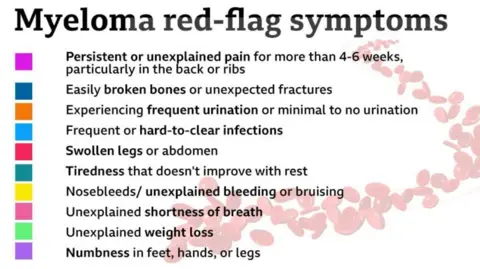Man gives blood cancer warning after diagnosis delay
 Handout
HandoutA man living with an incurable blood cancer is aiming to raise awareness of the symptoms to make sure others are spared the "unnecessary pain" he has suffered.
Jerry Cowhig, a father of two children from Bristol, was diagnosed with myeloma aged 68, following a year of excruciating chest and abdominal pain.
He has teamed up with blood cancer charity Myeloma UK to highlight the dangers of a delayed diagnosis, after an undetected tumour "ate away" at his spine.
He said: "Every GP should know about myeloma, and have it at the forefront of their mind. You shouldn't have to wait a year to find out what it is."
 Handout
HandoutIn 2013, Mr Cowhig began experiencing unexplained pain in his chest and abdomen.
He saw his GP multiple times and was even referred to a gastroenterologist, but no one could get to the bottom of his increasingly worrying symptoms.
"On one occasion, I was in London for a meeting and I was so doubled over in pain I couldn't take part. I barely managed to get home," he said.
It took a year for scans to show a tumour, known as a plasmacytoma, pushing down on his spine and causing his vertebrae to crumble.
"It had eaten away one vertebra completely," Mr Cowhig explained.
"I've worked in science publishing all my life and have written countless pieces on medicine and so forth, but I didn't know anything about myeloma or what it was."
 Myeloma UK
Myeloma UKNot long after his diagnosis, Mr Cowhig was hospitalised with a pulmonary embolism caused by his cancer medication, and he also developed shingles.
He later recovered but is still grappling with the long-term effects of his hospitalisation a decade later, especially on his breathing and mobility.
"Everybody tells GPs they should be more aware of x, y, z, but you can't expect them to be specialists in every disease," Mr Cowhig continued.
"I'm not saying every GP should test every patient for myeloma, it's completely unrealistic, but just to have it in their minds as a possibility.
"The floundering around for a diagnosis took a year out of my life and hit me with other problems.
"I went through so much unnecessary pain and suffering before someone found out what it was."
What is myeloma?
Myeloma is an incurable blood cancer which occurs in the bone marrow, and currently affects more than 24,000 people in the UK.
It is a relapsing-remitting cancer, meaning that although many patients will experience periods of remission following treatment, the disease will inevitably return.
Despite being the third most common type of blood cancer, myeloma is especially difficult to detect as the symptoms - including pain, easily broken bones, fatigue and recurring infection - are often linked to general ageing or other minor conditions.
The condition mostly affects people aged 65 and over but it has been diagnosed in people as young as 20.
While it is incurable, myeloma is treatable in the majority of cases.
However, Janis McCulloch, head of campaigns at Myeloma UK, said "every day counts" while waiting for a diagnosis.
"One of the biggest barriers remains identifying the symptoms quickly and before too much damage is done," she added.
"People with myeloma can't wait. We need your help to spread the word about myeloma and catch the disease earlier."
Follow BBC Bristol on Facebook, X and Instagram. Send your story ideas to us on email or via WhatsApp on 0800 313 4630.
